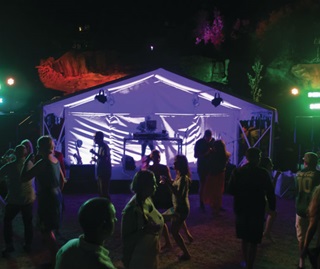
Dance parties require consent under the National Parks and Wildlife Regulation 2019 (NPW Regulation). Any application or written consent for a dance party should address the potential social and environmental impact of the event.
Policy
- As a minimum the application and consent for a dance party should address issues referred to in the following clauses of the NPW Regulation:
- entry to a park that is closed, or use of a park for a purpose other than that for which it was reserved (clause 6)
- the use of vehicles (clause 9)
- the use of machinery (clause 10)
- the potential to cause annoyance or inconvenience to any other person in the park (clause 8)
- the potential for littering or damage in a park (clauses 13 and 20)
- the need to protect native animals (clause 14)
- the potential for offensive conduct in a park (clause 15)
- the need to erect structures in a park (clause 20)
- whether the event involves commercial activity (clause 24)
- whether the event would attract more than 40 people or pose a risk to the safety of park visitors or other people (clause 25).

